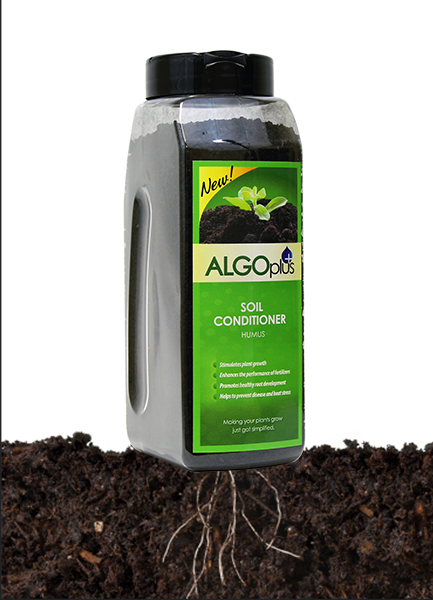
Humus
Easy Moisture Management
Humus is a naturally occurring soil conditioner known to be among the most bio-chemically active materials found in soil! It enhances the plants ability to take in the essential nutrients and improves soil structure.
The humus granules are biological, blendable dispersible and spreadable!

-
Humus is a naturally occurring soil conditioner known to be among the most bio-chemically active materials found in soil! Humus, or humic acid, is the commercial term often used to refer to the combined humic and fulvic acid content found in naturally occurring deposits.
• Enhances the performance of fertilizers - reducing the frequency of fertilizing
• Prevents disease and heat stress - promoting healthier plants
• Stimulates plant enzymes
• Promotes healthy root development and structure
• Improves water retention
• Reduces fertilizer runoff
• Assists in soil remediation
• Increases microbial and antioxidant activity
• Boosts seed germination
• Increases yields
• Enhances soil fertility
-
Algoplus+ Humus is extracted from the mineral anthracite deep mined coal by a process known as Leonardite. The result product is a water soluble black granule fortified with potassium Oxide. While humic acid does not directly provide nutrients to plants, it compliments fertilizers and reduces input cost. It is rapidly gaining recognition due to its beneficial impact on the growth and cultivation of crops, citrus, turf, flowers, and organically-deficient soils!
-
Easy to Apply!
Algoplus+ Humus is 100% water soluble and easy to use. Just mix 1 lb of Algoplus+ Humic Acid with 1 gallon water and apply to the soil once per month during the growing season. Algoplus+ Humus works very well in conjunction with all Algoplus liquid concentrate fertilizers.
-
What is Humus?
It is the dark brown to black colloidal mass of partially decomposed organic matter in the soil that acts as an organic chelator and microbial stimulator. It has a unique carbon matrix which includes a high concentration of trace minerals and organic acids. Humus, or humic acid, is the commercial term often used to refer to the combined humic and fulvic acid contect found in naturally occurring deposits.
Why use Humic Acid?
There is a recognized and increasing use of humic acids for their beneficials impact on the growth and cultivation of crops (vegetable & non-vegetable), citrus, turg, flowers, and particularly in organically-deficient soils. It does not directly provide nutrients to plants, but it is a compliment to fertilizer.
What does Humic Acid do?
Humic acids have a high cation exchange capacity (C.E.C) and help chelate nutrients and stimulate soil microbes.
What does Fulvic acid do?
Fulvic acids can be absorbed by roots and provide hormone-like stimulation to the plant. It also aids in the efficiency of other plants metabolic reactions.
How does Humic Acid improve soil?
Plant growth is improved through the structural improvement of both clay and sandy soil allowing for better root growth development. When applied to clay soils, humic acid helps break up compacted soils which allows for enhanced water penetration and better root zone growth and development. When applied to sandy soils, humic acid adds essential organic material necessary for water retention thus improving root growth and enhancing the sandy soil's ability to retain and not leach out vital plant nutrients.
How does Humic Acid improve plant growth?
Plant growth is improved by the ability of the plant to uptake and receive more nurtrients. Humic acid is especially beneficial in freeing up nutrients in the soil so that they are made available to the plant as needed. This action, coupled with fertilizer, increases the plants the nutrient availability and uptake. Humic acid is also especially important because of its ability to chelate micronutrients increasing their bio-availability.
How does Humic Acid effect microbial activity and what is its role?
Soil microbes are responsible for solubilizing vital nutrients such as phosphorus that can then be absorbed by the humic acid and made available to the plant. Microbes are also responsible for the continued development of humus in the soil as it continues to break down partially decomposed organic matter. Humic acid stimulates microbial activity by providing the indigenous microbes with a carbon source for food, encouraging growth and activity.
How does Humic acid complement fertilizers?
Although Humic acid is technically not a fertilizer, it is an effective agent to use as a complement to synthetic or organic fertilizers. It improves the intake of nutrients, making them available in the areas where the plant needs them. Regular humic acid use will reduce the need for fertilization due to the soil's and plant's ability to make better use of it. In some occurrences, fertilization can be eliminated entirely if sufficient organic material is present and the soil can become self sustaining through microbial processes and humus production.
See our FAQs page for more answers to popular questions or use our contact form if you need assistance.
